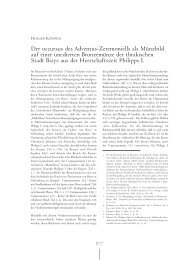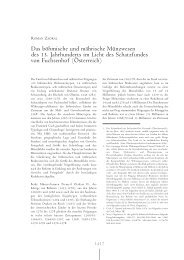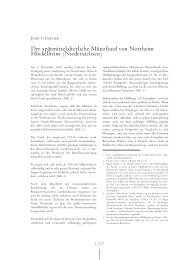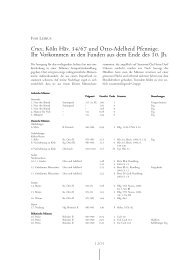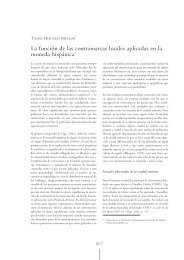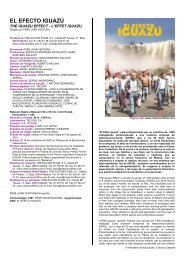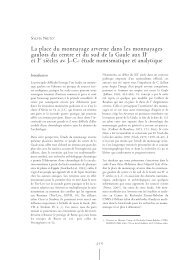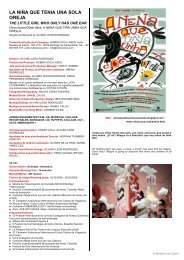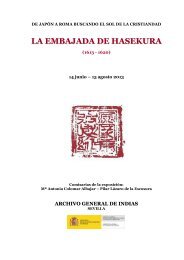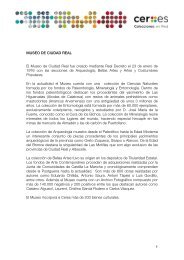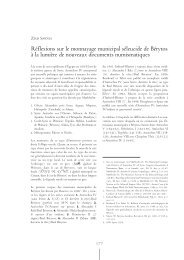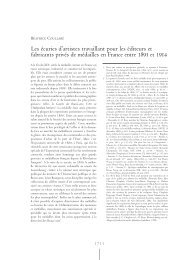La Ley de Memoria Histórica: reparación e insatisfacción Julio ...
La Ley de Memoria Histórica: reparación e insatisfacción Julio ...
La Ley de Memoria Histórica: reparación e insatisfacción Julio ...
Create successful ePaper yourself
Turn your PDF publications into a flip-book with our unique Google optimized e-Paper software.
<strong>La</strong> <strong>Ley</strong>, en su fondo, respon<strong>de</strong> al espíritu <strong>de</strong> una nueva generación, la que con propiedad ha sido llamada<br />
más <strong>de</strong> una vez <strong>de</strong> “los nietos <strong>de</strong> la guerra”, que no vivieron ésta pero que guardan <strong>de</strong> ella una “memoria<br />
heredada” y que tampoco participaron <strong>de</strong> forma activa en el proceso <strong>de</strong> la Transición. Este asunto no<br />
pue<strong>de</strong> ser, en forma alguna, minusvalorado y da, por lo <strong>de</strong>más, al texto legal su más significativa dimensión.<br />
El espíritu <strong>de</strong> la reconciliación <strong>de</strong>jó, ciertamente, muchos frentes abiertos, en especial en el terreno<br />
moral. <strong>La</strong> <strong>Ley</strong>, en todo caso, se presenta con ese espíritu reconciliador, <strong>de</strong> <strong>reparación</strong>, <strong>de</strong> reconocimiento<br />
<strong>de</strong> injusticias. Se equivocan lamentablemente, a nuestro juicio, quienes mantienen que su propósito es<br />
revanchista o parcial y, sobre todo, que viene a “reabrir” viejas heridas ya sanadas. No hay viejas heridas<br />
sanadas, porque no las ha cerrado nunca la justicia y, en ese sentido, la <strong>Ley</strong> no pue<strong>de</strong> reabrir nada que<br />
ya estuviese cerrado. No es inocente que quienes más cerradamente se oponen a la iniciativa no <strong>de</strong>jen<br />
<strong>de</strong> aludir a un espíritu reconciliador <strong>de</strong> la Transición que fue, justamente, el que no consiguió cerrar en<br />
justicia y eficacia esas heridas antiguas tan disparejamente tratadas durante medio siglo.<br />
<strong>La</strong> <strong>Ley</strong>, con más o menos acierto, intenta cumplir con esa <strong>Memoria</strong> en un grado mucho más <strong>de</strong>cidido<br />
que lo hizo la Transición, sin olvidos ni falsas reconciliaciones. De ahí que se haya dicho con acierto,<br />
según creemos, que el verda<strong>de</strong>ro espíritu <strong>de</strong>l texto refleja el sentimiento <strong>de</strong> buena parte <strong>de</strong> una nueva<br />
generación que no basa la reconciliación en el pensamiento transicional <strong>de</strong> los años setenta sino en la<br />
búsqueda <strong>de</strong> una legitimidad histórica como la que poseía la República subvertida por una sublevación<br />
ilegítima. Los fundamentos <strong>de</strong> la <strong>de</strong>mocracia se consolidan así y no por las necesarias transacciones obligadas<br />
en un proceso <strong>de</strong> superación <strong>de</strong> viejas tragedias, sino <strong>de</strong> la legitimidad otorgada por un régimen<br />
libremente elegido.<br />
¿Era preciso que este nuevo espíritu <strong>de</strong> <strong>reparación</strong> hubiese <strong>de</strong> instrumentarse a través precisamente <strong>de</strong><br />
una <strong>Ley</strong>? ¿Podría haberse conseguido el mismo fin por otros caminos menos solemnes pero tal vez más<br />
pragmáticos? He aquí una cuestión opinable sobre la que la mayor parte <strong>de</strong> las disquisiciones serían hoy<br />
ya ociosas. Existe una <strong>Ley</strong> <strong>de</strong> <strong>reparación</strong> y el gran reto ahora es convertirla en eficiente, en utilizar todos<br />
sus recursos y hacer que su utilidad recompense su tardanza. También ésta se <strong>de</strong>be a muy explicables<br />
razones. <strong>La</strong> Justicia es más fuerte cuando cumple con su propio tiempo y tempo. Pero la Historia impone<br />
casi siempre sus prescripciones.<br />
Therefore, having exposed these extremes, there is now<br />
space to try to express some commentaries and some<br />
explanations with regard to the justification or lack thereof<br />
of this dissatisfaction, of the reach of the <strong>La</strong>w itself, and<br />
of what can be hoped from its objectives and the measures<br />
put into action to achieve them. And there is room to<br />
express a first impression in terms of the perspective<br />
which the disposition presents and the possibilities of<br />
their fulfillment. The “Historical Memory <strong>La</strong>w” is without<br />
doubt an overdue disposition, incomplete in certain<br />
aspects, perhaps utopian in others, but which approaches<br />
with full justice the satisfaction of a collective <strong>de</strong>bt which<br />
was never faced with the generalness that it now is.<br />
The <strong>La</strong>w has been passed at an historic moment, at the<br />
beginning of a new century, whose characteristics sufficiently<br />
explain its own appearance. Thus, even if its<br />
Preamble, of tremendous interest, speaks from the reconciliatory<br />
spirit of the Transition to the <strong>de</strong>mocracy as its<br />
inspiration and the base of its dispositions, it is no less<br />
certain that its content and the moment in which it<br />
appears show us, rather, that the <strong>de</strong>nounced lacunae are<br />
related by all the critics with the form in which the protagonists<br />
of this Transition faced the re-consi<strong>de</strong>ration of<br />
the past that had brought along a long Dictatorship after<br />
a Civil War that was the product of an illegitimate uprising,<br />
as has been recognized by a parliamentary <strong>de</strong>claration<br />
of 2002.<br />
54<br />
The <strong>La</strong>w, at its base, responds to the spirit of a new generation,<br />
one which has been called more than once “the grandchildren<br />
of the war”, who didn’t live it but who have from it<br />
an “inherited memory” and who likewise didn’t participate<br />
actively in the process of the Transition. This fact cannot be<br />
un<strong>de</strong>rvalued, in any way, and otherwise gives the legal text<br />
its most significant dimension. The spirit of reconciliation<br />
certainly left many fronts open, especially in the moral<br />
realm. The <strong>La</strong>w, in any case, presents itself with this reconciliatory<br />
spirit, of reparation, of recognition of injustices.<br />
Those who maintain that its intent is vengeful or partial,<br />
and above all that it comes to “reopen” old wounds already<br />
healed are, in our opinion, lamentably mistaken. There are<br />
no healed old wounds, because justice has never closed<br />
them and, in this sense, the <strong>La</strong>w cannot reopen something<br />
which wasn’t closed. It is not innocent that those who most<br />
vehemently oppose the initiative don’t stop alluding to the<br />
reconciliatory spirit of the Transition which was, precisely,<br />
that which didn’t manage to justly and effectively close<br />
these old wounds so unevenly treated during half a century.<br />
Arriba, Ambulancia escocesa. Miss Jaconbsen. Madrid,<br />
1936-1939. Abajo, Entrega <strong>de</strong> objetos cogidos al enemigo<br />
en Villanueva <strong>de</strong>l Pardillo. Comandante 111. Madrid,<br />
1936-1939. Archivo Rojo. Archivo General <strong>de</strong> la Administración,<br />
Ministerio <strong>de</strong> Cultura.



